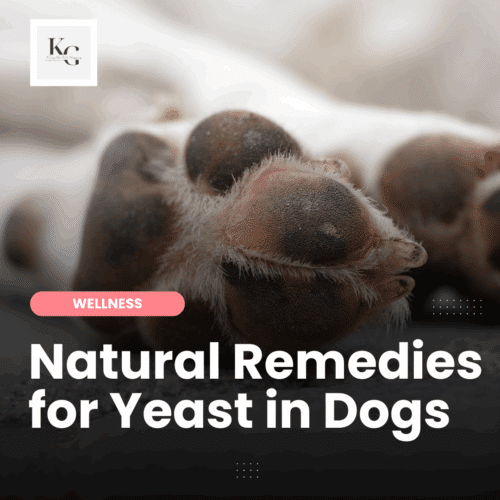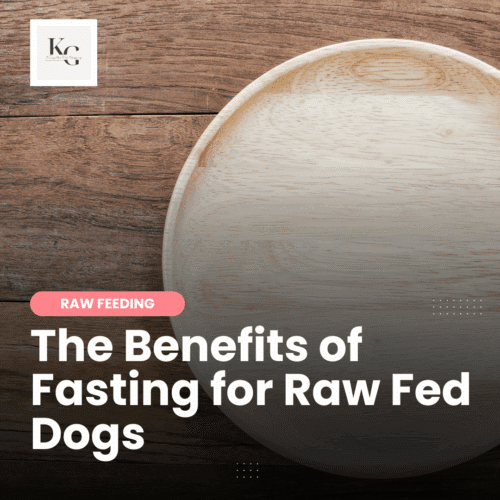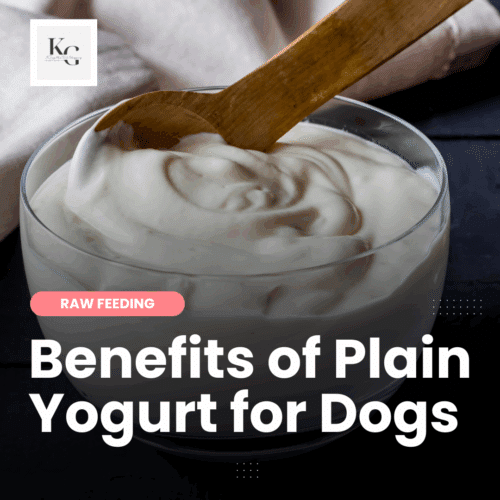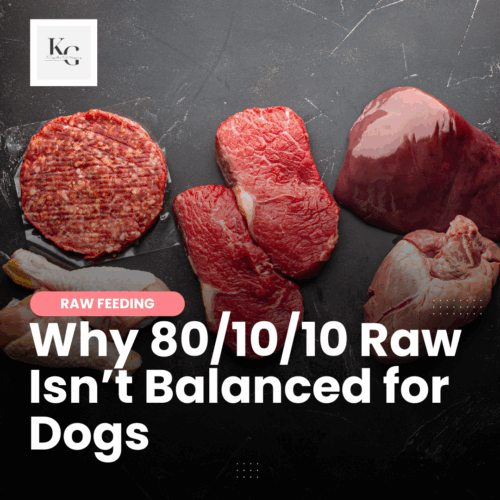Keep the Tail Wagging is supported by pet parents. I occasionally earn a commission (at no additional cost to you) when you click through an affiliate link to one of my favorite products. Thank you for your support. Read More
Plain yogurt for dogs is more than a tasty treat, it’s a powerful, probiotic-rich food that can support your dog’s digestive health, immune system, and more. When served in moderation and chosen carefully, plain yogurt is a safe and beneficial addition to your dog’s diet.
Benefits of Plain Yogurt for Dogs
1. Supports Gut Health
Yogurt contains beneficial probiotics (live bacterial cultures) that help balance your dog’s microbiome, improving digestion and reducing symptoms like gas, bloating, or irregular stools.
2. Boosts Immunity
A healthy gut contributes to a strong immune system. The probiotics in yogurt can enhance immune response and help reduce inflammation.
3. Provides Nutrients
Yogurt is a natural source of calcium, protein, B vitamins, and potassium—key nutrients for strong bones, muscles, and nerve function.
4. Helps Dogs on Antibiotics
Dogs on antibiotics may experience gut flora imbalances. Adding yogurt can help restore healthy bacteria.
5. A Cool Summer Treat
Yogurt makes an excellent base for frozen treats, offering a nutritious and hydrating snack during hot weather.
Yogurt isn't Species-Appropriate
Yogurt isn’t something wild dogs or wolves would naturally seek out. But not everything we feed domestic dogs needs to be ‘wild' or ancestral to be beneficial. Dogs have evolved alongside humans for thousands of years and have developed the ability to digest a broader range of foods than their wolf ancestors, including some dairy.
That said, yogurt is optional, not essential, and is only fed to dogs who tolerate it well. For many, it provides valuable probiotics, calcium, and protein, and can support digestive and immune health, especially after antibiotics or during stress. But it’s not necessary for every dog, and certainly not a staple in a homemade diet for dogs.
If someone prefers to skip dairy altogether in favor of more ‘species-appropriate' options, that's fine. Other excellent probiotic sources, like fermented vegetables or specific canine probiotic supplements, offer similar benefits without dairy.
At the end of the day, I think it’s about balance: choosing foods that support our dogs’ health, while still respecting their biological needs. What matters most is the individual dog and how they respond to their diet.
Yogurt Vs. Raw Goat's Milk and Kefir
1. Yogurt
- Definition: A cultured dairy product made by fermenting milk with Lactobacillus bulgaricus and Streptococcus thermophilus bacteria.
- Texture: Thick and creamy.
- Benefits: Contains probiotics, calcium, and protein. Supports digestion and immune health.
- Notes for Dogs: Use plain, unsweetened yogurt. Greek yogurt has more protein but less lactose, which may be easier to digest.
2. Raw Goat’s Milk
- Definition: Unpasteurized milk from goats, often considered more digestible than cow’s milk.
- Texture: Liquid.
- Benefits: Naturally contains enzymes, probiotics, electrolytes, and vitamins. Supports gut, skin, and immune health.
- Notes for Dogs: Easier to digest due to smaller fat molecules and lower lactose content. Raw form retains natural enzymes.
3. Kefir
- Definition: A fermented milk drink made with kefir grains (yeast + bacteria culture).
- Texture: Thin, drinkable consistency; slightly fizzy.
- Benefits: Contains a wider range of probiotics than yogurt. Excellent for gut health and immune support.
- Notes for Dogs: Can be made with cow, goat, or coconut milk. Use unsweetened varieties.
Key Differences
| Feature | Yogurt | Raw Goat’s Milk | Kefir |
|---|---|---|---|
| Probiotic Variety | Moderate | Naturally occurring | Very high (30+ strains) |
| Digestibility | Moderate (lower if lactose sensitive) | High (low lactose) | Very high |
| Texture | Thick | Liquid | Thin, drinkable |
| Fermented? | Yes | No (unless made into kefir) | Yes |
Homemade Yogurt Recipe (Instant Pot)
Ingredients:
- ½ gallon whole milk (organic, grass-fed if possible)
- 2 tablespoons plain Greek yogurt (with live active cultures, as a starter)
Instructions:
- Pour milk into your Instant Pot. Press the Yogurt button, then adjust to the Boil setting. This will heat the milk to ~180°F.
- Once the cycle ends, let the milk cool to about 110°F. Use a thermometer for accuracy.
- Stir in the Greek yogurt (starter culture).
- Press the Yogurt button again and set the timer for 8–10 hours.
- Once done, transfer to containers and refrigerate. Strain with cheesecloth if you want thicker, Greek-style yogurt.
Tip: Always use plain, unsweetened yogurt with no added flavors or sweeteners (especially xylitol, which is toxic to dogs).
How Much Yogurt to Feed Dogs
- Small dogs (under 20 lbs): 1–2 teaspoons per day
- Medium dogs (20–50 lbs): 1–2 tablespoons per day
- Large dogs (50+ lbs): 2–4 tablespoons per day
Start with a small amount to gauge your dog’s tolerance and adjust accordingly.
Frozen Yogurt Dog Treat Recipes
1. Berry Boost Bites
Ingredients:
- 1 cup plain yogurt
- ½ cup blueberries or chopped strawberries
- 1 tbsp chia seeds (optional)
Instructions:
- Blend all ingredients.
- Pour into silicone molds or ice cube trays.
- Freeze for at least 4 hours.
2. Banana Peanut Butter Pops
Ingredients:
- 1 ripe banana
- 1 cup plain yogurt
- 1 tbsp natural peanut butter (xylitol-free)
Instructions:
- Blend until smooth.
- Spoon into molds or trays and freeze.
3. Cooling Cucumber Mint Cubes
Ingredients:
- 1 cup plain yogurt
- ½ cucumber, peeled and chopped
- 2–3 mint leaves
Instructions:
- Blend all ingredients.
- Freeze in small molds or an ice tray.
Risks & Considerations
1. Lactose Sensitivity
Not all dogs can digest lactose. Yogurt contains less lactose than milk, but some dogs may still develop gas, bloating, or diarrhea.
2. Added Sugars or Artificial Sweeteners
Only feed plain, unsweetened, and xylitol-free yogurt. Avoid flavored or fruit-on-the-bottom varieties.
3. Caloric Impact
Yogurt contains calories and should be factored into your dog’s daily intake to avoid weight gain.
4. Overfeeding
Too much yogurt, especially if your dog isn’t used to it, can cause loose stool. Start slowly and feed in moderation.
Feeding Yogurt to My Dogs
Plain yogurt is a nutrient-dense, probiotic-rich food that can be a safe and beneficial supplement to a dog’s diet. When prepared at home, we completely control the ingredients, making it healthier. Just be mindful of portion sizes and your dog’s tolerance. I primarily feed yogurt as a frozen summer treat, freezing the yogurt with berries and other dog-safe fruits in Woof Pupsicles.
I prefer raw goat's milk and kefir for meals, which I feed once or twice weekly to keep their gut healthy and promote a diverse gut microbiome.





